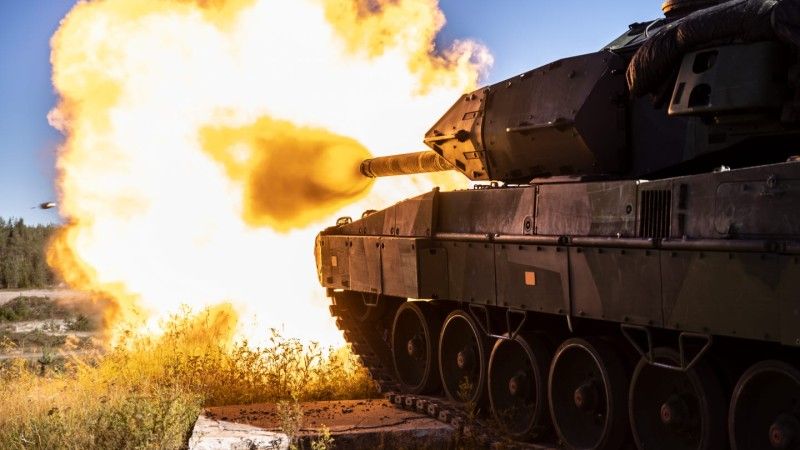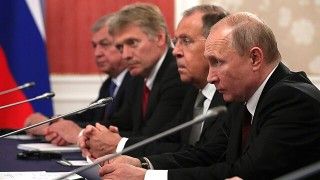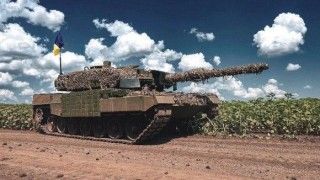- WYWIADY
- WIADOMOŚCI
Total Defence for the New Era. Swedish Expert: Increase of the Armed Forces Size is a Challenge [INTERVIEW]
Sweden’s defense policy and preparation for joining NATO became the basis for an interview with the Swedish security analyst Zebulon Carlander (program manager of the security policy at Folk och Försvar). In the discussion conducted by Jacek Raubo (Defence24), there are questions about what Sweden can bring to NATO’s collective defense and how Swedish total defense has been working recently. There were references to the future development of military and defense cooperation with Poland and other countries in the Baltic Sea region.

Jacek Raubo (Defence24) At the outset, I must ask directly - what will inclusion in the collective defense system mean for Sweden from the point of view of thinking about the country's defense? From the Swedish perspective, were the Russian actions in Ukraine such a solid motive to change classical strategic attitude?_
Zebulon Carlander - I think it is arguable that this can both be seen as an evolution and revolution of Swedish defense and security doctrine. Sweden has spent the past decades deepening cooperation with NATO and NATO members. This includes contributing in international operations, becoming more interoperable with NATO forces, as well as participating in large scale exercises. From that point of view, applying for a NATO membership is a natural next step. On the other hand, this is a historic change in Swedish defense and security policy. It is a shift in paradigms, if I may use that expression. This is more or less a break with 200 years of state policy where Sweden has been striving towards being neutral or at least militarily non-aligned. I think both Russia's demands of a revision of the European security architecture, and invasion of Ukraine in February, were a shock to Sweden.
This has led to many new decisions in the defense and security sphere. This includes sending thousands of AT4 anti-tank weapons to Ukraine, deciding to commit to a two percent goal of defense spending and the application to join NATO. It is important to note that this was a decision done in tandem with Finland, which is our closest partner in defense matters. It would have been difficult to see a scenario where one of us is joining NATO and the other is not doing it. There is current work ongoing on determining the implications of NATO membership for the Swedish Armed Forces. I think it is fair to say that Swedish defense planning has for many years been structured around having extensive cooperation with NATO and NATO allies in case of a military contingency in our neighborhood. This is reflected in the scenarios for different exercises. This will be easier as a NATO member.
What are the greatest strengths of the modern Swedish Armed Forces? What can Sweden bring to NATO right now? Of course, when it comes to military potential?
There are many things that I could highlight. The force overall is very professional, skilled and experienced. The Swedish Air Force is one of the strongest in Northern Europe, especially as we will see the Jas Gripen E introduced in the air force squadrons. We also have very capable submarine service. Currently the next generation of submarines, the Blekinge-class, are being produced and these will be very capable systems. This shows that the Swedish defence industrial base is strong and competent. Sweden is also acquiring the Patriot Air Defense System, which reached initial operational capability late last year.
I cannot escape the question of the biggest challenges and problems for the Swedish armed forces, seeing the possibility of joining NATO. At the same time, where does Sweden see its priorities when it comes to modernizing its armed forces?
I think the challenges facing Sweden will feel very familiar to a lot of European defense analysts. There is certainly an issue of scale. After the Cold War, the Swedish Armed Forces were restructured to focus on international operations. This created the political logic of downsizing the military, which led to the abandonment of the conscription model and a focus on smaller, albeit more professional, forces. With a conflict in our region being the primary defense problem now, this puts greater emphasis on having larger quantities of both personnel and equipment. The Russo-Ukrainian War has reminded us of this. The latest defense bill has increased the number of units, particularly within the army.
There is also a desire to seize the opportunities of new technologies and domains, for example when it comes to operating UAVs, enhancing our space situational awareness, or using artificial intelligence to improve data processing. Sweden has a strong and competent industrial base, so the possibilities here are significant. Finally, I think there is a realization that to be able to build this new force structure, there has to be good personnel management as well. Sweden having conscription does not solve all recruitment and retention issues, especially the latter. This means making a career in the armed forces more attractive in terms of pay, opportunities and professional development.
In Poland, Sweden is very often cited as an example of a country developing the concept of total defense. Hence, I would like to ask what is the total defense for Sweden in the 21st century, and will join NATO change anything in how it is defined?
To have a successful total defense we cannot try to recreate or perserve what worked in the past. Because of changes with our economy, political structure and demography, as well as the different threat environment, the total defense concept has to be adapted to current circumstances. This means, for example, that there is a lot of work being done on how to improve cooperation and coordination between the public and private sector in dealing with different contingencies. The pandemic showed the possibilities for effective public-private partnership, but to optimize this potential there has to be arrangements and agreements made before a crisis or conflict breaks out. I think it is possible that NATO membership will, for example, enable deeper regional cooperation on pooling and sharing of resources for dealing with total defense issues, especially from a Nordic perspective.
Sweden is a country that has long been closely cooperating with the Nordic countries when it comes to security and defense issues. So does the cooperation above facilitate joining NATO and collaboration with a broader group of allies?
Yes, I think there will be great possibilities to deepen Nordic defense cooperation when all Nordic states are part of NATO. There is already strong Nordic defence cooperation. There is, for example, the cross border training in the High North between the Swedish, Finnish and Norwegian Air Forces. But with NATO membership there is now the possibility to have joint defense planning and to improve joint capability development. Being in the same collective defense system means that previous limitations imposed on Nordic defence cooperation will be lifted. This will benefit security in Northern Europe.
Will Sweden's accession to NATO potentially increase the need of military cooperation with Poland in the regional dimension? How can one characterize, from the Swedish perspective, the hitherto cooperation with Poland in the field of security and defense?
Sweden has had defence cooperation with Poland since the 1990s and this has been strengthened during the past few years. I think one area of potential is in the area of air defense and surveillance. Both Sweden and Poland operate the American Patriot Air Defense System and it is operationally possible to connect the sensors of these systems to enable real-time data sharing. This would improve our collective situational awareness in the Baltic Sea Region. I would suspect with Poland making such large increases in its defense spending, it will become a more important regional actor for Sweden as well as other allies in the neighborhood.
Sweden is famous for its developed arms industry and domestic production capacities. Does joining NATO, apart from the presence in the EU, meaning that it will also be a profit for this segment of the country's economy?
It is clear that Sweden's decision to apply for membership in NATO is based on an assessment of the security threats, not because of any perceived benefits to Swedish industry. It should be said that the Swedish defense industry already has deep relationships within the transatlantic community. With that being said, yes, becoming a NATO member probably means there will be new opportunities for the Swedish defense industry.
Is there, from Sweden's perspective, a need to rapidly strengthen Gotland's defense? In this case, are the fears most focused on unconventional and asymmetric threats, or maybe just conventional ones?
The Swedish Armed Forces has already re-established its presence on Gotland where the core component is an armored battalion with some additional units. The military presence is growing in size and capabilities as we speak. Earlier this year, the Swedish Armed Forces showed that it has the capability to rapidly reinforce the defense of Gotland with additional units if need be. Some of the actions undertaken were made public, while some were not. It should be stated that all measures to improve defense of Gotland does not have to be physically on the island itself. To answer your second question, I think there is a recognition that the threat spectrum is quite wide and does not only involve conventional threats. That means we have to prepare for a variety of contingencies ranging from cyber attacks to sabotage.
NATO strengthened the eastern flank with the presence of combat groups, and new ones are being created right now, for example, in Romania. Is there a discussion in Sweden relating to the need to include the country in NATO's eFP, so that, hypothetically such a NATO battle group would also be developed in Sweden?
Yes, there is a discussion on what sort of contributions Sweden will be expected to make as a NATO member. There is a report that will be presented in November on this matter by the Swedish Armed Forces that will address this issue. This will eventually be determined within NATO's defence planning process. What I can say is that there is a very clear signal from the political and military leadership that Sweden is determined to be a net producer of security as a NATO member and that we take our responsibilities as an ally seriously.















